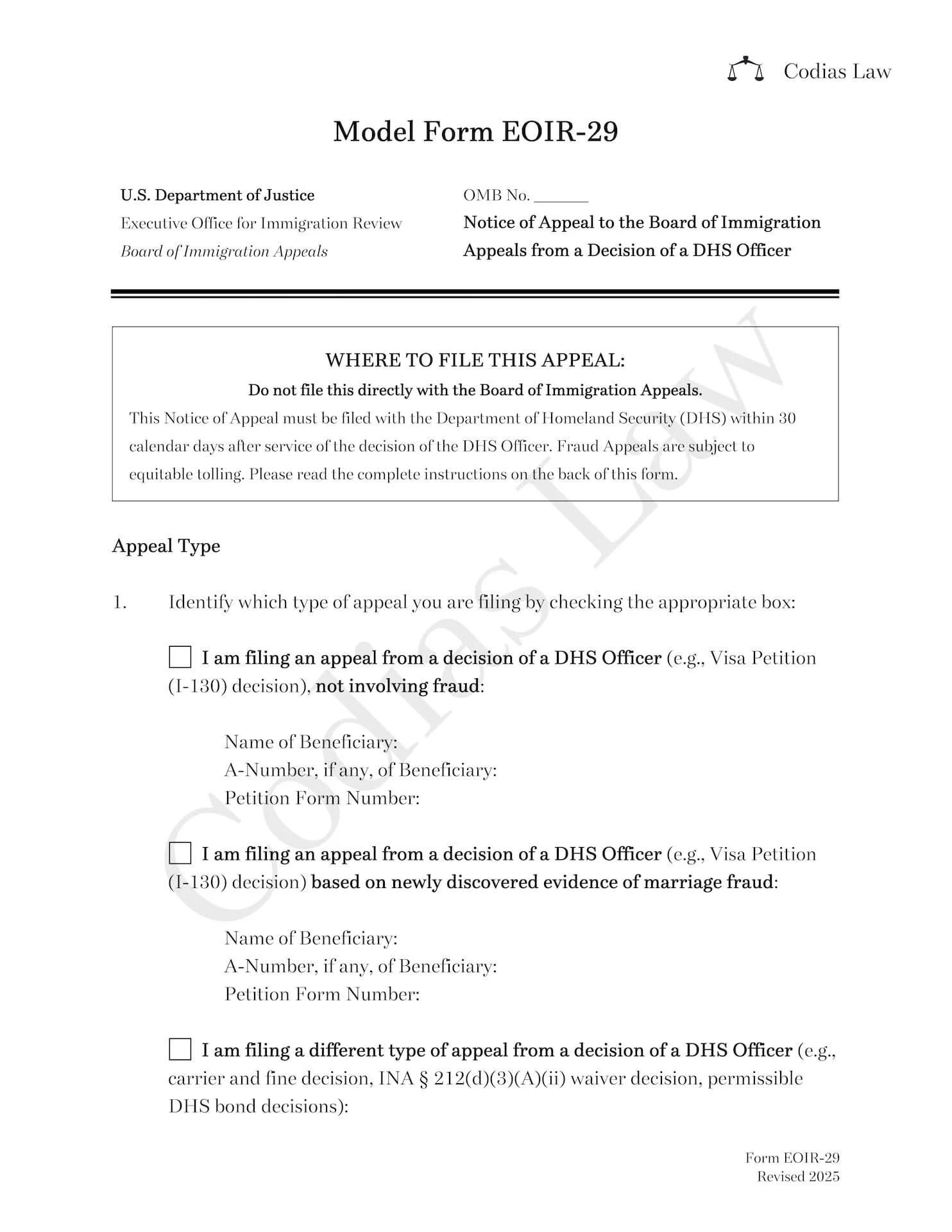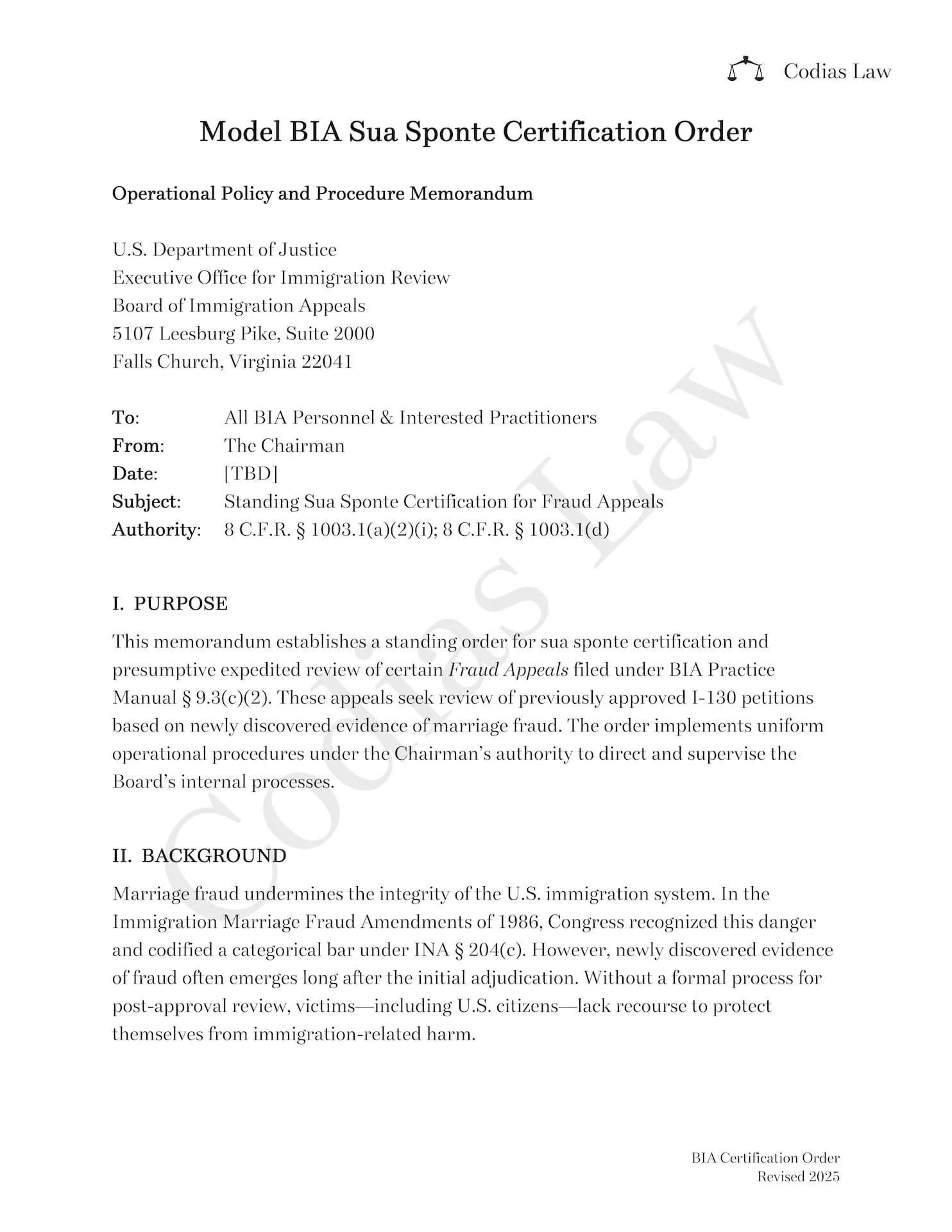
INNOVATIVE ADVOCACY
BIA Fraud Appeals
A simple process to revolutionize marriage fraud enforcement and promote victim safety.
Overview
A process for marriage fraud victims.
A BIA Fraud Appeal allows a victim of marriage fraud to challenge a previously approved I-130 petition based on newly discovered evidence of marriage fraud.
THE PROBLEM
Enforcement Failure
Marriage fraud is a felony and renders foreign nationals ineligible for I-130 approval under INA § 204(c). Yet federal agencies routinely fail to enforce the law, leaving U.S. citizens vulnerable to fraud, I-864 lawsuits, and public safety and national security risks.
THE SOLUTION
Independent Review
The BIA already has jurisdiction under 8 C.F.R. § 1003.1(b)(5) to hear appeals from DHS decisions. The Board simply needs to formalize procedures to govern appeals of approved I-130 petitions based on marriage fraud.
THE BENEFITS
Fraud Prevention
BIA Fraud Appeals ensure federal statutes are enforced, victims are protected, system integrity is safeguarded, and public safety and national security are strengthened. Victim-initiated appeals also help conserve federal investigative resources.
Marriage to a U.S. Citizen is the #1 Green Card Pathway.
Each year, marriage to a U.S. citizen accounts for 23% of all new immigrants—making it the single largest individual immigration category and the most vulnerable for fraud. Its scale and risk demand rigorous enforcement, oversight, and safeguards for the American people.
Top Immigration Pathways by Volume
The Problem
DHS is failing to enforce the law.
Despite a zero tolerance policy created by Congress, the U.S. Department of Homeland Security routinely fails to enforce marriage fraud statutes, leaving victims and the taxpayer vulnerable to exploitation.
Marriage Green Cards Are Fraud Magnets
Foreign spouses enjoy powerful immigration advantages: quota-free visas, adjustment of status, fast-tracked citizenship, waivers of inadmissibility, and rapid family sponsorship. These extraordinary benefits create strong incentives for fraud, making marriage green cards one of the most targeted and exploited pathways in the U.S. immigration system today.
Congress Codified a Zero Tolerance Policy
Congress explicitly criminalized marriage fraud under 8 U.S.C. § 1325(c), making it a standalone felony offense. Under INA § 204(c), any attempt to secure an I-130 petition through fraud results in a permanent bar to immigration benefits—reflecting Congress’s clear, longstanding zero-tolerance mandate toward marriage fraud.
INS and BIA Raised the Bar Unlawfully
The legacy INS improperly heightened the standard of proof for marriage fraud determinations under INA § 204(c) by regulation, while the BIA adopted an extratextual definition drawn from case law predating the Immigration Marriage Fraud Amendments of 1986—ignoring the modern statutory language and weakening Congress’s categorical bar on marriage fraud.
ICE is Not Investigating Marriage Fraud
ICE has effectively abdicated its role in marriage fraud enforcement. Victims reporting credible evidence are routinely told ICE does not handle individual cases, leaving fraud uninvestigated and perpetrators undeterred. Alarmingly, some ICE offices do not even have an immigration benefit fraud unit, abandoning a core part of their enforcement mandate.
DOJ is Not Prosecuting Marriage Fraud
Although Congress created 8 U.S.C. § 1325(c) to criminalize marriage fraud, DOJ’s own data shows it has filed only 16 cases since 1996. Marriage fraud is deemed such a low enforcement priority that DOJ’s own Prosecuting Immigration Crimes Report (PICR) does not even track prosecutions under this provision.
USCIS is Failing to Police Marriage Fraud
With ICE and DOJ largely absent, USCIS has become the main agency responsible for addressing marriage fraud. Yet a 2022 GAO report revealed USCIS lacks a national antifraud strategy, regularly waives fraud findings, and conceals statistics—making it impossible for Congress or the public to assess its performance.
USCIS Historically Denied 0% of Marriage Cases for Fraud.
Despite Congress’s zero-tolerance policy, USCIS reports an effective fraud denial rate of zero percent for marriage-based petitions—revealing a shocking failure to faithfully enforce the laws passed by Congress.
The Solution
Victims can invoke an existing regulation.
Victims of marriage fraud can appeal previously approved I-130 petitions to the BIA, based on new evidence of fraud, under the BIA’s existing appellate jurisdiction.*
BIA Intervention is Critical
The BIA plays a vital oversight role, ensuring immigration laws are faithfully enforced. DHS has consistently failed to police marriage fraud, despite clear statutory mandates, leaving the BIA as one of the last institutional safeguards for victims and for the integrity of the immigration system.
BIA Already has Jurisdiction
The BIA’s jurisdiction under 8 C.F.R. § 1003.1(b)(5) covers appeals from any DHS decision on I-130 petitions—approvals or denials. Supreme Court and USCIS interpretations confirm this, and the regulation’s broad use of “decisions,” as distinct from “denials,” makes clear the BIA’s authority extends to unlawful approvals.
BIA Already Reviews INA § 204(c) Findings
Under 8 C.F.R. § 1003.1(d)(3)(iii), the BIA may review de novo all legal, factual, or mixed questions, including marriage fraud determinations under INA § 204(c). This empowers the BIA to reassess whether a petition was unlawfully approved, ensuring independent oversight and correcting DHS failures.
USCIS Must Deny Petitions for Marriage Fraud
INA § 204(c) imposes a mandatory bar on approving I-130 petitions involving marriage fraud. Approval is not final until all appeals conclude, making the BIA’s review part of the adjudication. As confirmed in Bouarfa v. Mayorkas, if credible fraud evidence arises before final agency action, the petition must be denied.
Equitable Tolling Applies to the 30-Day Deadline
Supreme Court precedent presumes equitable tolling for non-jurisdictional deadlines, like the 30-day appeal period for I-130 petitions established in regulation, unless Congress explicitly says otherwise. When victims show diligence and extraordinary circumstances, the BIA can and should apply equitable tolling to allow fraud-based appeals to be heard.
Attorney Certification Prevents Abuse
Even without equitable tolling, the BIA has authority under 8 C.F.R. § 1003.1(c) to certify cases sua sponte. A standing protocol—triggered by a licensed attorney’s sworn submission and backed by federal and state ethics rules—would ensure that only credible, diligently prepared fraud claims reach the Board, preventing abuse while protecting victims.
Disclaimer on BIA Fraud Appeals
A BIA Fraud Appeal is an innovative legal procedure that involves a higher level of risk because case law and agency precedent in this area remain limited. While Codias Law believes these appeals rest on solid legal footing and are fully appropriate within existing statutes and policies to protect U.S. citizen sponsors and victims of immigration fraud, clients should understand that this is a novel area of practice at the forefront of emerging legal interpretation. Until federal courts and agencies provide more definitive guidance, these services should be pursued only by clients who are comfortable with the uncertainties and risks that come with developing areas of law.
The Benefits
Everyone benefits, except the fraudster.
BIA fraud appeals benefit the entire immigration system—except for the unindicted felons exploiting U.S. citizens, our laws, and our institutions.
Victim Empowerment
Empowers victims with a formal avenue to challenge unlawful I-130 approvals, avoid I-864 lawsuits, and end abusive entanglements with perpetrators of fraud.
Public Safety
Boosts public safety and national security by closing loopholes in marriage-based immigration and protects taxpayer dollars from fraud-driven costs.
Resource Efficiency
Conserves investigative resources within agencies by allowing victims to initiate action and present credible fraud evidence directly, improving administrative efficiency.
Statutory Enforcement
Ensures Congress’s explicit marriage fraud ban under INA § 204(c) is upheld, restoring the antifraud framework it established and ensuring the law is faithfully enforced.
Model BIA Implementation Documents
Ready-to-use forms and guidelines the BIA can adopt under existing law to formalize marriage fraud appeals and fully enforce INA § 204(c) — no new legislation required.
Form EOIR-29
This form is used to file BIA appeals and includes updated language to ensure proper processing of fraud-based appeals.
BIA Practice Manual
The practice manual includes updated guidance for how practitioners can file fraud-based appeals before the BIA.
BIA Certification Order
This memorandum establishes a standing order for sua sponte certification and expedited review of Fraud Appeals.
Sign the Petition for BIA Fraud Appeals
*Update: This petition was filed with federal authorities on July 30, 2025. Signatures will remain open until reforms are adopted.
To:
Pamela Bondi, U.S. Attorney General
Sirce E. Owen, Director of EOIR
Garry D. Malphrus, Chairman of the BIA
We, the undersigned, respectfully petition the Board of Immigration Appeals (BIA) to issue formal guidance affirming its existing jurisdiction to hear appeals from DHS decisions, including appeals of previously approved I-130 petitions based on newly discovered evidence of marriage fraud under INA § 204(c), and to adopt the model reforms we are providing to implement these procedures.
Marriage to a U.S. citizen is the single largest pathway to lawful permanent residence, accounting for approximately 23% of new green cards each year. It is also the most fraud-prone category because it offers uniquely powerful advantages: quota-free immigrant visas, adjustment of status, expedited citizenship, waivers of inadmissibility, and rapid family sponsorship. These extraordinary incentives have made marriage-based immigration a prime target for fraud and exploitation.
Recognizing this risk, Congress adopted a zero-tolerance policy, making marriage fraud a felony under 8 U.S.C. § 1325(c) and imposing a categorical benefits bar under INA § 204(c). Yet despite these mandates, federal agencies systematically fail to protect victims and enforce the law. ICE has abandoned individual marriage fraud investigations, DOJ is not prosecuting individual marriage fraud cases, and USCIS — by default the primary enforcer — lacks even a national antifraud strategy, routinely waives known fraud, and disregards credible evidence submitted by victims. Shockingly, USCIS reports a fraud denial rate of effectively zero percent for marriage-based applications. As a result, victims are left trapped in abusive legal and financial entanglements — including I-864 support lawsuits — with no meaningful recourse.
In this enforcement vacuum, the Board stands as one of the last institutional safeguards for victims and the immigration system. As detailed in our June 25, 2025 testimony before Congress (available at www.codiaslaw.com/bia-fraud-appeals), the national marriage fraud crisis demands urgent corrective action. Under 8 C.F.R. § 1003.1(b)(5), the BIA already has appellate jurisdiction over DHS decisions, including both approvals and denials. What’s missing is not authority — but formal procedures that empower victims to challenge fraudulent I-130 approvals without relying on a dysfunctional USCIS.
Supreme Court precedent further supports this process: equitable tolling applies to non-jurisdictional deadlines when diligence and extraordinary circumstances are shown — a critical protection given the BIA’s 30-day appeal deadline under 8 C.F.R. § 1003.3(a)(2), which often expires before fraud is uncovered. Notably, the Board has already adopted equitable tolling for appeals from immigration court decisions but has never had the opportunity to extend this protection to fraud-based appeals from DHS decisions. Formalizing that extension would ensure victims are not denied justice simply because the fraud they suffered was deliberately concealed.
We now ask the Board to formally adopt the following model implementation documents (available at www.codiaslaw.com/bia-fraud-appeals):
Proposed Revisions to Form EOIR-29
Proposed Revisions to the BIA Practice Manual
Proposed Sua Sponte Certification Order
These reforms will benefit every part of the system — protecting victims, preventing abusive I-864 lawsuits, strengthening public safety and national security, conserving scarce investigative resources, and upholding the antifraud framework Congress established.
Most importantly, these reforms will breathe life into EOIR’s own recent anti-fraud policy commitments. In February 2025, EOIR explicitly recognized in Policy Memorandum 25-19 that immigration fraud “constitutes a direct attack” on its institutional integrity, warning that its recent lack of urgency has only encouraged more fraud and underscoring the need for agency-wide action to restore public trust. The Board now has the opportunity — and the duty — to act.
Read our Full Report
On June 25, 2025, our managing attorney, Cody M. Brown, exposed the marriage fraud crisis on the national stage in testimony before the U.S. House Judiciary’s Subcommittee on Immigration Integrity, Security, and Enforcement.
Brown dissected how federal agencies have failed to faithfully execute the Immigration Marriage Fraud Amendments Act of 1986 and outlined a three-step plan for the Trump administration to protect victims and swiftly remove unindicted felons through BIA fraud appeals, a USCIS revocation division, and an immigration fraud court.
























